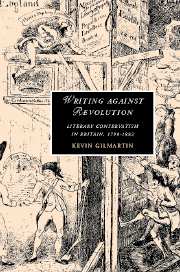Book contents
- Frontmatter
- Contents
- Illustrations
- Acknowledgments
- List of abbreviations
- Introduction: Reconsidering counterrevolutionary expression
- 1 In the theater of counterrevolution: loyalist association and vernacular address
- 2 “Study to be quiet”: Hannah More and counterrevolutionary moral reform
- 3 Reviewing subversion: the function of criticism at the present crisis
- 4 Subverting fictions: the counterrevolutionary form of the novel
- 5 Southey, Coleridge, and the end of anti-Jacobinism in Britain
- Notes
- Bibliography
- Index
- CAMBRIDGE STUDIES IN ROMANTICISM
3 - Reviewing subversion: the function of criticism at the present crisis
Published online by Cambridge University Press: 22 September 2009
- Frontmatter
- Contents
- Illustrations
- Acknowledgments
- List of abbreviations
- Introduction: Reconsidering counterrevolutionary expression
- 1 In the theater of counterrevolution: loyalist association and vernacular address
- 2 “Study to be quiet”: Hannah More and counterrevolutionary moral reform
- 3 Reviewing subversion: the function of criticism at the present crisis
- 4 Subverting fictions: the counterrevolutionary form of the novel
- 5 Southey, Coleridge, and the end of anti-Jacobinism in Britain
- Notes
- Bibliography
- Index
- CAMBRIDGE STUDIES IN ROMANTICISM
Summary
In its initial outbreak and enduring impression the revolution controversy in Britain has been considered a pamphlet controversy, precipitated by the dual flashpoints of Burke's Reflections on the Revolution in France (1790) and the two parts of Paine's Rights of Man (1791, 1792), and driven forward by the pamphleteer's dialectical logic of provocation and response. While such newspapers as The Times, the Morning Post, the Courier, the Sun, the Oracle, and the True Briton were careful observers of contemporary events as well as vigorous participants in controversy, periodical forms have on the whole been less closely identified with the first phase of debate over the French Revolution and domestic radical organization. Periodical expression then breaks through spectacularly with the appearance of the Anti-Jacobin; or, Weekly Examiner of 1797 and 1798. In its heterogeneous weekly format, its slashing and reckless satirical manner, and its coterie production by a group of energetic young men associated with the future foreign secretary and prime minister George Canning, this first Anti-Jacobin can seem altogether too distinctive to be the inaugural moment for a subsequent lineage of conservative magazines and reviews. Yet it was invoked in just those terms by later writers and editors, and its appearance towards the end of the 1790s, after the effective suppression of the distinctive radical movement associated with the London Corresponding Society, suggests a shift from pamphlet warfare to the sequence of important reviews and magazines that conducted conservative political expression through the early nineteenth century, including the second Anti-Jacobin Review and Magazine (1798–1821), the Quarterly Review (1809–), and Blackwood's Edinburgh Magazine (1817–).
- Type
- Chapter
- Information
- Writing against RevolutionLiterary Conservatism in Britain, 1790–1832, pp. 96 - 149Publisher: Cambridge University PressPrint publication year: 2007



